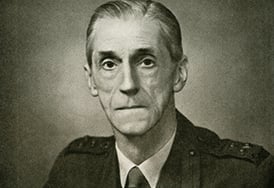
Brigadier General Sir William Wallace Stewart Johnston CBE, DSO, MC, ED OM 1905
Last updated: 2008
One of Australia's most distinguished army medical officers, Brigadier General Sir William Johnston made a significant contribution to medical organisations in Australia. After graduating in medicine from The University of Melbourne in 1914 he completed his internship at the Melbourne Hospital.
In the First World War he enlisted at the rank of Captain and served with distinction in Egypt and France. At Pozieres in 1916 he was awarded the Military Cross for his bravery in treating wounded on the open battlefield. He also received mention in despatches.
At Ypres in 1917 he was recommended for the Victoria Cross for attending casualties on the battlefield, where he himself was seriously injured by artillery fire. He was awarded the Distinguished Service Order and promoted to the rank of Major. After the First World War Johnston returned to private practice and consultancy in Melbourne. He also served in the local militia, becoming Assistant-Director of Army Medical Services in 1938 and being promoted to Colonel.
During the Second World War he commanded the 2nd Australian General Hospital in Palestine and served in Libya, Greece, Crete, Egypt and Syria. He was honoured as a Commander of the Order of the British Empire in recognition of his distinguished service in the Middle East. In New Guinea he was also mentioned in despatches for his work against malaria, the evacuation of sick and wounded from the Kokoda Track and in supplying medicines to the front.
Johnston later made a significant contribution to medical organisations in Australia. He was Medical Officer of the Australian Red Cross Society, Director and Chairman of the Melbourne Medical Post Graduate Committee, Chief Commissioner of the St John Ambulance Brigade and Vice-President of the Royal Australasian College of Physicians. Johnston was appointed a Knight of Justice of the Order of St John and later received a knighthood for his services to post graduate medicine.
Melbourne Grammar School marked its sesquicentenary in 2008. As part of the celebrations, a Talents Committed Exhibition was staged. This exhibition recognised 150 Old Melburnians who have made a difference to the City of Melbourne, the State of Victoria and the wider community in Australia and overseas.
The above profile was included in the Talents Committed Exhibition in 2008.
